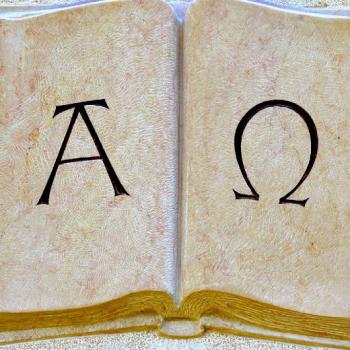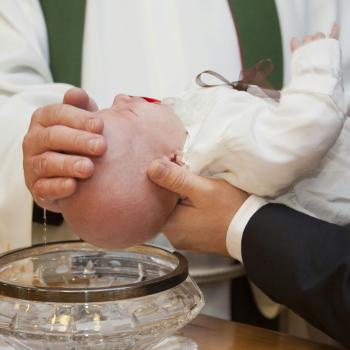Sharlet:The manifesto can be understood in part as a story Breivik is telling to himself about himself. The arc is that of a lost/found narrative. He first moves from being a secular hip hop fan (nobody's paid much attention to the sections against hip hop) to a person convinced of Christianity's utility but not very religious (that might be described as his Fjordman phase, after the anti-Islamic blogger whose critiques of Christianity he includes). He describes himself as a "moderately religious" person at the end, but one who has moved steadily toward a more scriptural sense of his mission via the discovery of writers such as Americans Joseph Farah and a Catholic priest named Fr. Dwight Longenecker. The latter was a graduate of Bob Jones University and convert to Catholicism from whom Breivik takes a critique of what he sees as "sentimental" Christianity. He's not interested in piety, he's interested in broadswords—much like the mega-selling American Christian conservative author John Eldredge, author of Wild at Heart. In that book, a guide to constructing a muscular Christianity based on warrior movies like Braveheart, Eldredge describes his broadsword; it's ironic that even Breivik seems slightly more aware of the silliness of the symbol, even as he boasts of owning one.
To me, and to any serious scholar of religion, I suspect, this question of whether or not Breivik is a Christian is a distraction. He understands himself as a Christian. The challenge for us is to understand what he means by that. Reading the sources he lays out for us can help us do that. And anyone—left or right—who suggests that the fact that Breivik is a Christian somehow condemns Christianity is as much of a bigot as those who said that the fact that Osama bin Laden was a Muslim proved anything about Islam as a whole.
Regardless of Brevik's religious views, the more pressing question is whether those views influenced his actions. What role did his religious understanding play in his crime?
Hemingway:It's important to note that a high percentage of this document deals with either Islam or Christianity in general and Breivik's particular religious views. While he concedes that he doesn't have a "personal relationship" with Christ, he is a huge fan of Christianity as a "cultural, social, identity and moral platform." And he does get into some of his particular religious values. For instance, he argues from Scripture in favor of what he calls "self-defence." He quotes from Genesis on through the words of Jesus himself in an attempt to argue for violently attacking those who oppose his particular socio-political views. He thinks that certain Crusader popes had a better understanding of self-defense and he'd like Christians to return to that view. Of course, none of this quite makes sense unless you understand that he also convinced himself that his terror attack against Norwegian political players was an act of self-defense against multiculturalism.
He earnestly believed that his action would lead to a revolution in his country, Europe, and throughout the world. He also imagined that it would encourage Christians to unite under Rome and adopt his ideas on self-defense and preemptive strikes. So while his religious system of belief is unorthodox and unsupported by any known Christian or other religious group, it was used to justify his attack in his mind.
Sharlet:He says they played a great deal. The turning point for him, he says, was the NATO attack on the Serbs. He shared no nationalism with the Serbs—he saw it as bad Christians attacking good Christians to defend Muslims, who, for him, are almost beyond good and evil, as it were. He grabs on to "cultural Christianity" and then, through his relationship with it, finds what he sees as justification for violence through his study of the Crusades and what might be called Constantinian Christianity. Once he's in, via this "knightly" understanding of the faith, he starts "discovering" in scripture more and more "proof" of his interpretation. His prescription for Christian Europe becomes much, much more specific, often rooted in contemporary issues related to American conservative Christian discourse, such as homeschooling. But he goes further, describing his ideal Christian state as a sort of mixture of Ayn Rand—the only author of more than one book on his favorites list—and statist Christianity. "Atlas Hugged," to borrow a phrase from former Gov. Mark Sanford, another Christian Rand fan. And his spirituality—a term I'm using neutrally here—starts to take on a greater presence in the text, until we get close to the end, with the "Bible battle verses," his meditation, and his spiritual preparation for his final mission.
Do you see parallels between Anders Breivik and, say, Sayyid Qutb and Osama bin Laden?





